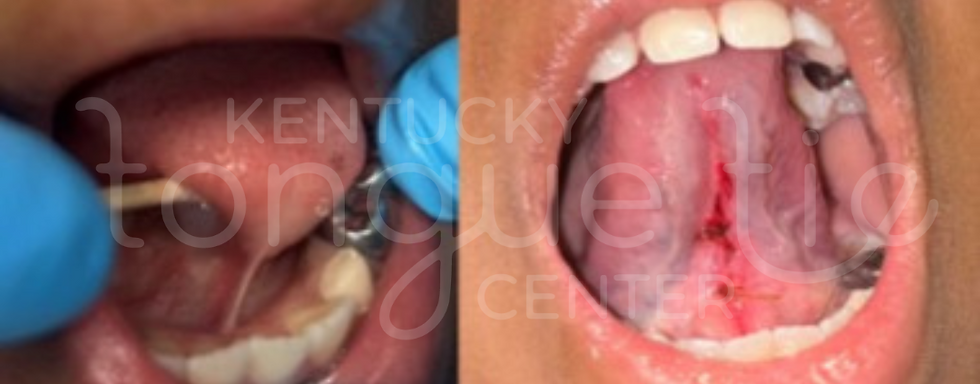Understanding Tongue-Tie in Children: Why the Confusion Persists
- Austin Rodenberg
- Jun 17, 2025
- 3 min read
Updated: Jun 22, 2025

During my time as Chief Resident for Pediatric Dentistry at Norton Children's Hospital in Louisville, Kentucky, I would take call for the emergency department at the children's hospital. This provided me an opportunity to work with the Pediatric Emergency Medicine Residents/Fellows on a weekly, if not daily basis.
One day, I was asked by this group of pediatric emergency medicine physicians to give a seminar on pediatric oral and dental trauma. These physicians were part of one of the two level one pediatric trauma hospitals in the state of Kentucky. It is safe to say that they were regularly exposed to and well trained in trauma and how to manage life threatening situations. Despite their wealth of knowledge and experience, one area that they did not feel comfortable with was trauma occurring in the mouth, especially if teeth were involved. It turns out, these incredibly smart, well intentioned physicians, with 6-7+ years of professional education were given very minimal (and in some instances) one lecture in medical school about the basics of the oral cavity and teeth. In my presentation, one of the most important questions I was asked was how to distinguish between a baby tooth and an adult tooth. This was eye opening for me. I realized that something I considered so simple, to my medical colleagues, could be more stressful than managing a broken bone.
This realization was the beginning of my understanding of the role of a specialist. My presentation wasn't needed to teach them how to be specialists of oral and dental trauma, but simply to help them recognize basic concepts that would allow them to determine the urgency of the case presented to them and refer accordingly.
I mention this story because, my experience in the emergency department taught me a crucial lesson. No one, regardless of their training and background, is an expert in every field. Even amongst physicians, relying on specialists enhances patient care and leads to more accurate diagnoses. This is particularly vital for patients with more complex conditions. A family doctor might direct a patient to a cardiologist, who could subsequently refer them to a pediatric cardiologist for more complicated situations. Similarly, a dentist may send a patient to an oral surgeon, endodontist or pediatric dentist depending on particular needs of the patient. It is crucial for family doctors and dentists to to have relationships with these specialists, as they possess specific knowledge for their patient's unique situation.
When a parent comes to our office with their infant, child or teenager for a tongue or lip-tie evaluation, one of the first questions I ask them is what brings them to my office. A common answer I receive tends to involve someone telling the parent that their child has a tongue and/or lip-tie and that they need to have it treated. That "someone" may be a pediatrician, a dentist, a therapist, a friend, a family member, a social media post, etc. Sometimes parents will note how they have had two, three, or even four different opinions as each physician, dentist, or therapist provided a different answer. These cases are particularly sad because the parent wants to do the right thing but doesn't know which is the right answer. So the question is...who is right and why why is it so hard to get an consistent answer?
Well, the answer goes back to my earlier story: not all providers (physicians, dentists, therapists) are qualified to diagnose or treat a tongue and/or lip-tie due to a lack of training of what a tongue-tie actually encompasses. Tongue and lip tie diagnosis and treatment are not normally taught in either medical or dental school. So, just because you go to see your physician or dentist doesn't mean that individual has been appropriately trained in this specialized field and may not be able to provide the most updated information on the subject.
If you believe that you or your child is having difficulties because of a tongue or lip-tie, I suggest seeking out specialized providers in your area who focus on treating this condition using both surgical and non-surgical approaches. For instance, IBCLCs are lactation consultants with extra training that includes assessing the mechanics of the tongue and lip during breastfeeding.
At the Kentucky Tongue-Tie Center, we pride ourselves on collaborating with physicians, dentists and therapists who have taken the time to become experts, "specialists", in the field of tongue and lip-ties. Their expertise provides a good foundation for parents who come to my office for an evaluation and treatment of a tongue or lip-ties.
Dr. Rodenberg is a Board-Certified Pediatric Dentist who practices in the Louisville, Kentucky area and is the founder of the Kentucky Tongue-Tie Center.



Comments